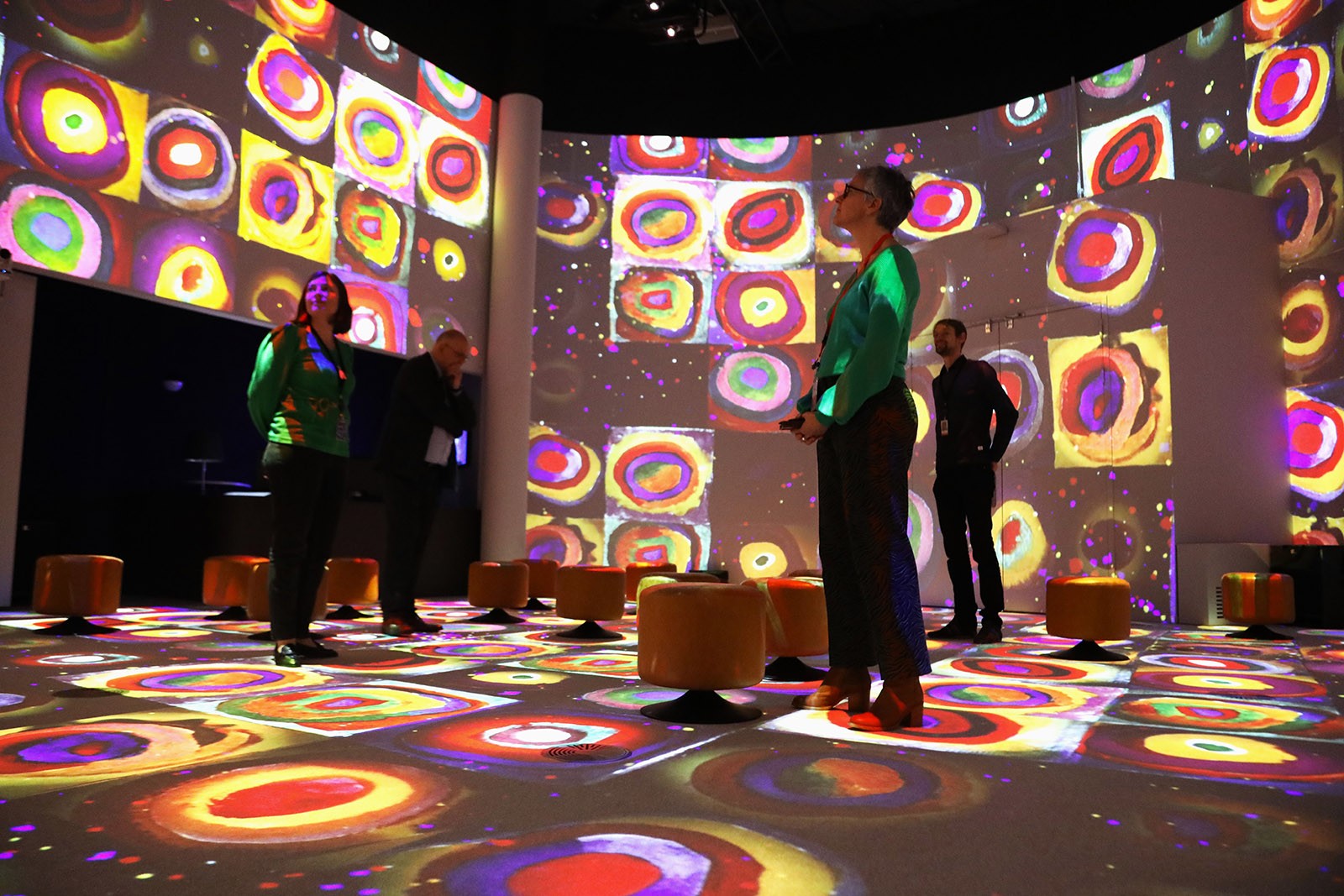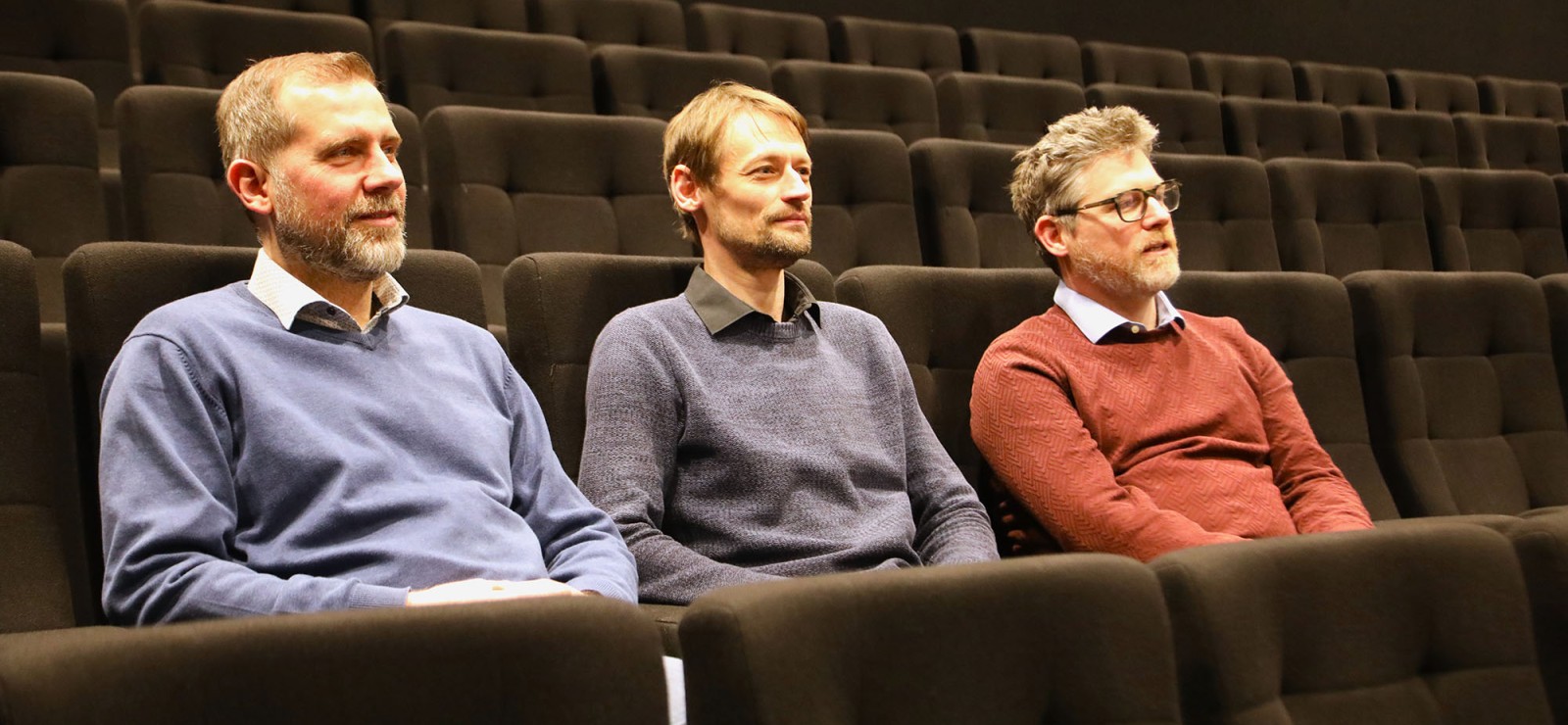On February 23, three Ghent University alumni walked the red carpet in Hollywood to receive a prestigious award from the Academy of Motion Picture Arts and Sciences, known for the Oscars.
Goran, Wouter and Peter receive the Scientific and Engineering Academy Award for the revolutionary cinema projector they developed at tech company Barco.
We meet the three alumni at the magnificent Barco campus, which they laughingly describe as "a little piece of Silicon Valley in Kortrijk". But for the three engineers, it all started on the Ghent University benches.
Their PhD turned out to be a great asset in the business world. Peter Janssens: "I pursued my PhD with professor emeritus Dirk Ryckbosch on nuclear and particle physics. Working with lasers is also physics. The basis I had built up in experimental research within nuclear physics I could thus transfer to the development of laser projection."
"The nice thing about completing a PhD is that you work together with a young group of people, but still each in your own domain, you help each other, your view of the world opens up through the research and the places you end up," Wouter D'Oosterlinck says. "Anyone who has done fundamental research also knows what biting through is."
Laser projector is revolutionising cinema
That the three Ghent University graduates can persevere is proven by the award given to them by the Academy for the development of a cinema projector with laser technology that provides a high-quality cinema experience: more stable images, vibrant colours and greater clarity.
Peter explains how the ball got rolling years ago. "Projectors with xenon lamps used to be the norm. But these had their limits: the brightness was not high, the lamps weakened quickly or flickered and they consumed a huge amount. The ever larger screens in cinemas demanded another kind of technology. Moreover, such lamps are special hazardous waste after use because they can explode."
Lots of room for improvement, then. Peter: "I started my career at Barco in 2007 with small-scale research into using lasers for projectors instead of lamps. That's how we developed a first small prototype. The colours were noticeably better, but we could still optimise."
Aligning with Hollywood
Wouter D'Oosterlinck and Goran Stojmenovik strengthened the laser research team. With the release of Avatar in 2009, development gained momentum. Goran: "That film was a real tipping point. Cinemas did have to invest in 3D technology and that required more brightness."
The team coordinated their development with suppliers and with Hollywood. "We needed to get Hollywood on board so we gave demos in the US with our laser prototypes. We researched the needs of studios, directors and cinemas. We had a driving role to introduce laser." recalls Wouter.
"From 2014, we saw a revolution in the market. Components became more compact and prices started to drop," adds Goran. Wouter: "Besides durability, design plays a prominent role: our first projector was really a beast if you compare it to the latest models."
Already 30,000 cinema theatres worldwide with laser projectors
The result: longer-life projectors that are cheaper to buy and maintain. Laser projectors are now accessible to cinemas around the world. Already 30,000 cinema halls are equipped with them, including those of Kinepolis. Even the Academy uses the projectors for rating films. "And Peter's basic research is still the foundation of today's projectors," Wouter stresses.

Laser projectors are not only used in cinemas, but also at events and in museums.
Skills and interest are more important than knowledge
When asked if they have any tips for young graduates who want to follow their path, Wouter immediately picks up: "As a young engineer, you are looking for what you want. You have doubts but you have enough baggage from your education."
"You can go to so many places as an engineer. Look through vacancies. The basic skills and interest in technology are important, rather than the knowledge behind it." add Goran and Peter.
Read also
Ghent University Alumnus of the Year Marianne De Backer: “When someone tells you you’re too ambitious, you’re on the right track”
Marianne De Backer is a heavyweight in the world of biotechnology. Today she is CEO of Vir Biotechnology, a biotech company headquartered in Silicon Valley. She is a champion of women in leadership positions in this still male-dominated industry.
Plottwist in Hollywood: should film awards pay more attention to diversity?
De Oscars zijn nog steeds de belangrijkste filmprijzen ter wereld. Maar er is ook jarenlange kritiek op het gebrek aan diversiteit en inclusie bij de awards. Ondertussen zijn diversiteitscriteria aangescherpt, maar hoe effectief zijn deze maatregelen eigenlijk?
Connected to Ghent University for life: why our alumni are so important to us
The role of alumni within any university is not to be underestimated. “Our contact with ex-students is immensely important for so many reasons: research, education, reputation, talent management and more besides…. ,” maintains Emeritus Professor Kristiaan Versluys.
Serhat goes from Ghent University to Harvard: "I want to bring healthcare to people who are excluded from it"
Serhat Yildirim (26) just completed his final exams in medicine after which he will start at the prestigious Harvard University. He was admitted for the two-year master's degree in Global Health Delivery.




